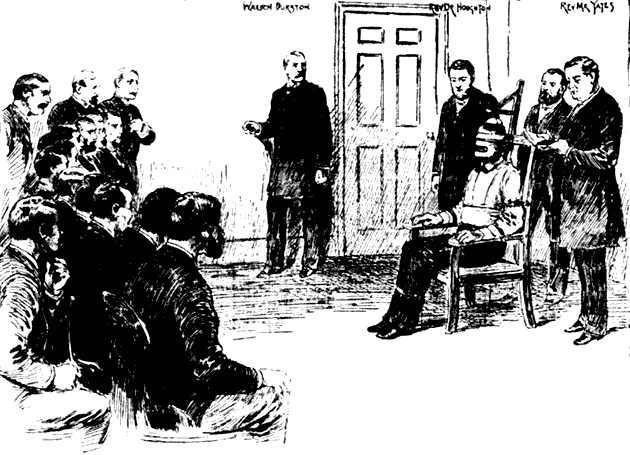It happened today - August 6, 2015
 August 6 saw a classic breakthrough in the name of the progress we all seem to worship today when, 55 years before the first atomic bomb was dropped on Hiroshima, William Kemmler was the first man executed in the electric chair.
August 6 saw a classic breakthrough in the name of the progress we all seem to worship today when, 55 years before the first atomic bomb was dropped on Hiroshima, William Kemmler was the first man executed in the electric chair.
Now I have no problem with bombing Hiroshima. It was a legitimate act of war and moreover it saved millions of lives, mostly Japanese. And the American nuclear arsenal has kept the world more peaceful since than at any point since the 19th century Pax Britannica began to break down. Si vis pacem, para bellum.
I also have no problem with capital punishment. There are crimes God can forgive that man cannot. Frankly I don’t think Kemmler’s hatchet murder of his common-law wife was in that category. He was a drunken failure with a tough and disorderly life and I think when such people kill in a drunk and disorderly way they should generally get a long prison sentence not a death sentence.
I would reserve the death sentence for crimes of a kind of calculating embrace of great evil: sexually sadistic killings, planned mass murders (including terrorism), treason and so on. But that’s not my issue here.
My concern is with the way the mania for progress led people to hook up this new-fangled electricity to the justice system. There was even a lively debate whether to use alternating or direct current; J.P. Morgan, backing Thomas Edison’s direct current for general use, wanted the electric chair to be on alternating current partly to prove AC was dangerous. But why use electricity at all?
Was there any suggestion that hanging, beheading or a firing squad didn’t work? Were they somehow cruel or unusual? I know some people think the death penalty is inherently so. But if you grant that it is not for purposes of argument, did traditional methods inflict a demeaning amount of pain over an unreasonable amount of time in a disgusting way?
The electric chair certainly did. Kemmler’s death was evidently gruesome, though not everything the yellow press printed in its effort to sell papers through lurid sensationalism should be believed. But it took a couple of tries and did certainly create the stench of charred flesh. As George Westinghouse, the main entrepreneur behind alternating current, said afterward, “They would have done better using an axe.”
Indeed. Kemmler’s attorney’s unsuccessfully appealed on the basis that electrocution was cruel and unusual. It seems to have been then, and sometimes is to this day. But even if it could be designed so as not to be, it’s certainly weird and unnecessary.
I get the superficial appeal of “new and improved” for a breakfast cereal. But we ought to be immune to such claims, and to fads, when it comes to serious things like taking a human life after due deliberation. Especially when the claim is clearly false in this case.
An ax was good enough for Charles I and a rope for Adolph Eichmann. And they’re good enough for me.